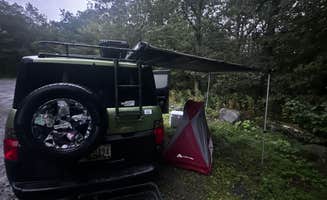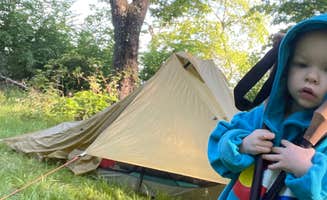The mountainous terrain surrounding Spring Brook, Pennsylvania offers multiple primitive camping options within the Delaware Water Gap National Recreation Area and nearby state forests. Most sites in this region require campers to pack out trash and supply their own water. Camping is predominantly dispersed with minimal facilities, making proper preparation essential for overnight stays.
What to do
Overlook hiking: From Bake Oven Knob campsites, access rocky trails leading to panoramic viewpoints. "The hike to the overlook is really lovely; short and rocky," notes camper Dani T., who frequently uses the area as both an overnight spot and day hiking destination.
Trail exploration: Several camping areas provide direct access to extensive trail systems. At Hickok Brook, primitive sites serve as jumping-off points for forest exploration. The area offers "beautiful but buggy lakeside tent sites" according to visitor Corey, making bug spray essential for comfortable hiking.
Overnight backpacking: Numerous unmarked sites exist along trails for experienced backpackers seeking solitude. One backpacker staying at Thunder Swamp Trailhead mentioned, "Tons of hiking. Went down Saw Creek trail to a marsh," highlighting the diverse ecosystems accessible from camping areas.
What campers like
Hammock-friendly terrain: Most dispersed camping sites feature ample trees suitable for hammock camping. Katharine T. notes about the Appalachian Trail Designated Backpacker Campsite 2: "Good trees for hammocking," making this a popular option for those who prefer hammocks to tents.
Privacy options: Many camping locations offer both communal and secluded site placement. "We camped nearer to others but there are secluded spots too," reports Katharine T., indicating campers can choose their preferred level of isolation.
Bear safety infrastructure: Several designated sites provide bear boxes for food storage. According to campers, these areas are "well maintained with bear boxes provided," allowing visitors to secure food and scented items away from sleeping areas.
What you should know
Limited water sources: Most primitive camping sites near Spring Brook lack reliable water access. Renee Z. advises: "Stock up on water at the Dunnfield creek natural area, or wait until Sunfish pond," when planning overnight stays.
Permit requirements: Camping regulations vary across the region. At Hickok Brook, one camper discovered: "Where I originally camped was not a spot, according to Ranger. Had to move next to the lake. Need a permit on NY state land. Contact Rangers office of whatever county."
Restricted fire use: Fire regulations are strictly enforced at most sites. Multiple campers report "no ground fires" policies at designated Appalachian Trail campsites, requiring visitors to use stoves for cooking.
Limited cell service: Prepare maps and emergency plans before arrival, as most areas have poor connectivity. No designated emergency facilities exist at primitive sites.
Tips for camping with families
Site selection: For families with young children, parking lot proximity matters. Benjamin H. describes Thunder Swamp Trailhead as "a gravel parking lot. Plenty of shade. No one bothered me," making it accessible for families needing easy vehicle access.
Wildlife precautions: Teach children proper food storage practices. Several sites provide bear boxes, but families should bring animal-proof containers when camping at undesignated locations.
Weather preparation: Mountain areas experience significant temperature drops overnight, even in summer. Pack additional layers for children regardless of daytime temperatures.
Tips from RVers
Road conditions: Access roads to primitive camping areas often present challenges for larger vehicles. One RVer reports about nearby forest roads: "The road is very rough with huge potholes so good clearance is a must. It's not a good spot for car camping but you could conceivably drive up to the spots and pull off the road."
Overnight parking alternatives: Some trailhead parking lots permit overnight stays. Jason R. found that at Appalachian Trail Campsite, "Trailhead parking was chill for a night. No trouble," offering an option for self-contained camping vehicles.
Size limitations: Most primitive camping access points cannot accommodate large RVs. Small vans and truck campers fare better on the narrow, rough forest roads typical of the region.




